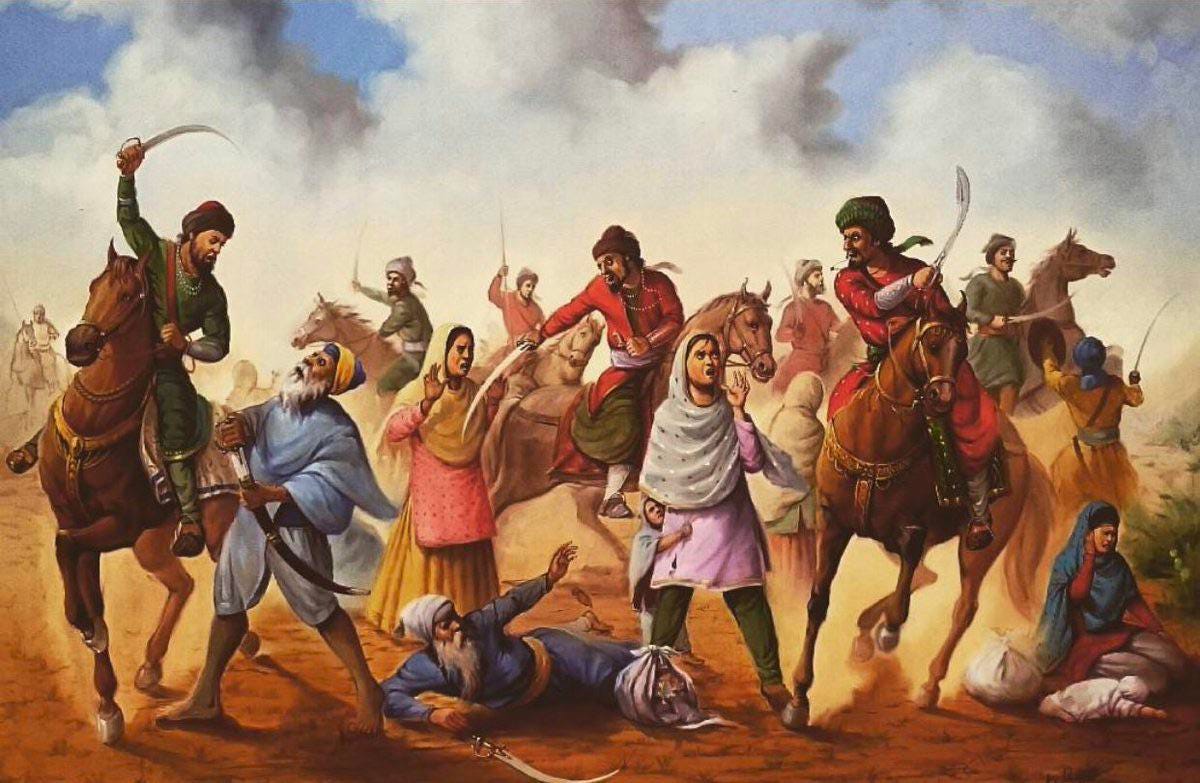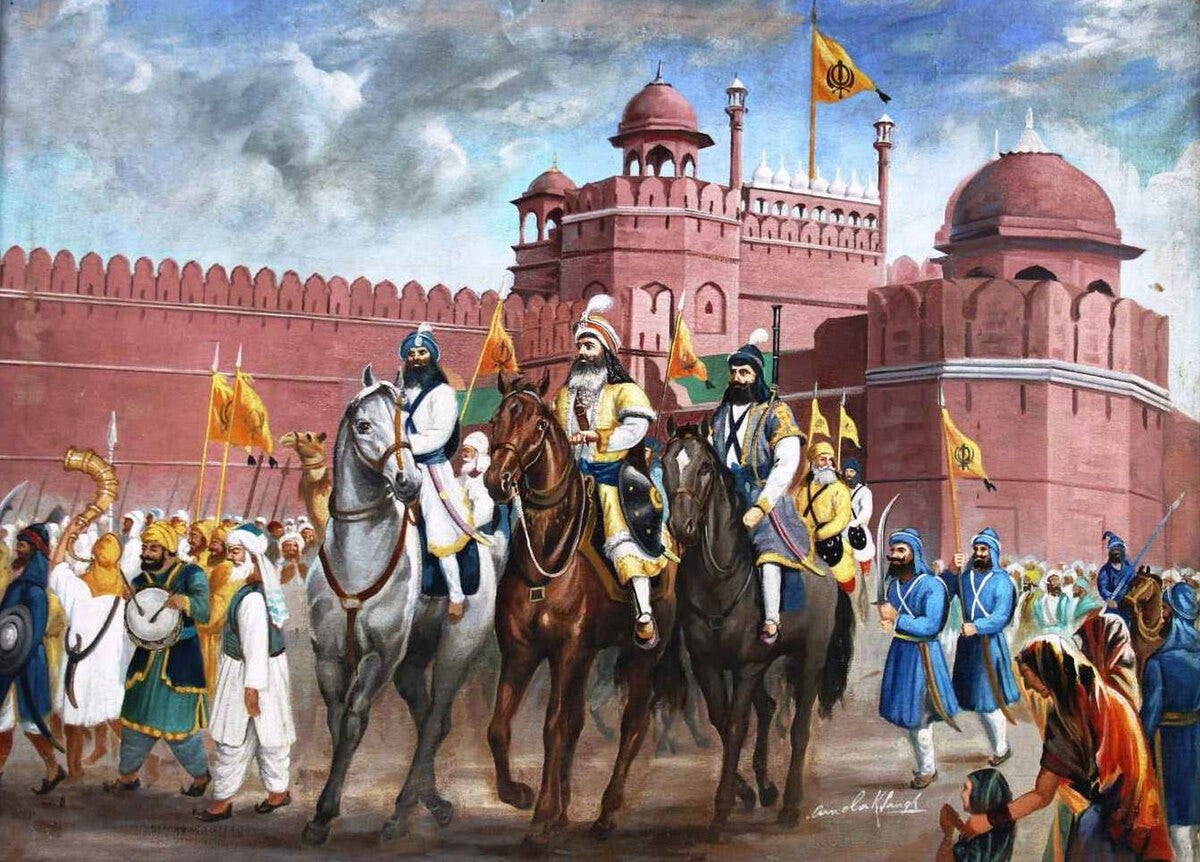When Christianity first emerged in the Roman Empire, it began as a minority religion, often persecuted and confined to small communities. Yet, within a few centuries, Christianity didn’t just secure control its home territory of Jerusalem and its surrounding regions—it reshaped the entire Roman Empire, transforming it from a pagan stronghold into the heart of Christendom. Christians didn’t stop with small ambitions; they had the vision to take the empire itself. So the question arises: why are Sikh ambitions so limited? Why is there a persistent focus on Punjab, as if that’s the only area for consideration when it comes to Sikh sovereignty? Our Punjab-centrism has narrowed our vision so much so it is now a tunnel vision where we forsake broader opportunities that could not only help us secure Punjab but so much more.
The Roman Example: Expanding Beyond Jerusalem
The early Christians didn’t restrict themselves to Jerusalem alone. They understood that in order to truly thrive, they needed to influence the very structures of power—the Roman Empire itself. By doing so, they secured a far larger stake in world affairs, beyond the small tracts of land that defined their early history. Imagine if Christians had only concerned themselves with squabbling over small territories in and around Jerusalem. They would have missed the opportunity to transform the Roman Empire and, through it, the course of world history.
But how exactly did Christianity take over the Roman Empire? The answer lies in a combination of strategic adaptation, leadership, and influence, much of which Sikhs today can learn from as they pursue broader ambitions.
Strategic Adaptation and Networking
Christianity, from its early days, spread through the vast network of Roman roads, trade routes, and cities. Followers of Jesus, particularly apostles like Paul, travelled extensively across the Roman world, from Asia Minor to Greece and Italy, preaching not just to Jews, but to Gentiles (non-Jews). This inclusivity and openness to different peoples was key to Christianity's growth. Unlike some Jewish sects that remained insular, early Christians reached out to a wide audience, adapting their message to different cultures and languages while still retaining their core beliefs.
Lesson for Sikhs:
In a globalized world, Sikhs must also be willing to engage beyond traditional boundaries. By building bridges with diverse communities and adapting to various social, political, and economic contexts, Sikhs can establish broader influence, just as early Christians did within the Roman world. It is also worth reiterating that the vast network of Roman roads allowed for the spread of ideas, and this can be likened to the network available via the internet today. Sikhs must leverage this, and to be fair, we have as a community. We must continue developing increasingly accessible ways to engage with and find out about Sikhi, especially for non-Punjabis. One major risk factor with accessible networks is also the spread of misinformation. But the only way to get round this is to compete. Fight bad ideas with better ideas.
Perseverance Amid Persecution
Christianity faced centuries of persecution by Roman authorities, primarily because it was seen as a threat to the empire's religious and political unity. Roman society was polytheistic, and worship of the Roman gods and emperor was not just a religious duty but also a political one, symbolizing loyalty to the state. Christians, however, refused to participate in this practice. They believed in one God and rejected the divinity of the emperor, which put them in direct conflict with Roman law and societal norms.
Because of this refusal to conform, Christians were viewed as subversive and potentially destabilizing to Roman order. Roman authorities accused Christians of undermining the unity of the empire, and as a result, the early Christian community faced waves of persecution, particularly during the reigns of emperors like Nero, Decius, and Diocletian. Christians were often blamed for disasters or societal problems, such as the great fire of Rome, and many were tortured, imprisoned, or killed in public arenas.
Despite this, persecution didn’t crush the Christian movement—it often had the opposite effect. The resolve of Christian martyrs, who faced death with courage and faith, became powerful symbols of devotion. Stories of these martyrs spread across the empire, inspiring others to join the faith. Rather than weakening the community, persecution strengthened the solidarity and commitment of Christians, and the movement continued to grow. The sense of shared suffering gave the early Christians a sense of purpose and unity, which helped them to persevere and expand, ultimately transforming the Roman Empire itself.
Lesson for Sikhs:
Historically, Sikhs have faced intense persecution, especially during Mughal rule, the Anglo-Sikh wars, and more recently at the hands of the Indian government during events such as the 1984 anti-Sikh genocide. However, the community’s resilience in the face of adversity, much like the Christians in the Roman Empire, has been a defining feature of Sikh identity. The Sikhs' ability to remain in Chardi Kala and rise stronger after each wave of persecution is embedded in the spirit of the Khalsa.
Today, however, a critical issue is the tendency to dwell on past suffering without enough focus on solutions and a forward-looking vision. Persecution, rather than being a catalyst for strength and growth, has often been turned into a recycled narrative of victimhood. This constant rehashing of past injustices risks reducing the Sikh community to one that reacts to oppression, rather than proactively shaping its future. It’s true that the Sikh community has suffered, but focusing solely on these hardships without a strategy for future growth limits the community's ability to expand its influence and visibility in a broader context.
This reactive stance can trap the community in a cycle of proving its oppression, rather than empowering Sikhs to engage globally with strength and self-confidence. The focus on victimhood is in direct contrast to the legacy of the Khalsa, which has historically bounced back with remarkable resilience. After facing genocides like the Vadda Ghalughara (The Great Holocaust of 1762) and the Chhota Ghalughara (The Lesser Holocaust of 1746), the Khalsa not only survived but thrived. Within a few short years, they had regrouped and regained their strength, even going on to establish the Sikh Empire under Maharaja Ranjit Singh.
This ability to transform tragedy into triumph was a cornerstone of Sikh history, and it’s a lesson that should be applied today. Sikhs must transcend the victim narrative and look at persecution as a momentary challenge in a much longer journey of growth. Instead of constantly reacting to external threats (and even this is insufficient most of the time), the Sikh community must focus on creating a proactive strategy that leverages its resilience for global influence and leadership.
In a world where power is often about influence rather than territory, Sikhs should draw from their historical strength, not as a community that has been victimized, but as a community that has consistently overcome and thrived. Just as the early Christians, despite centuries of persecution, moved beyond the fear of oppression to transform the Roman Empire, Sikhs too can shape their destiny by focusing on empowerment, self-sufficiency, and leadership.
The Chardi Kala spirit that allowed Sikhs to rise from the ashes of persecution in the past should now drive the community to take charge of its global future—building institutions, excelling in education and business, and participating in international governance. By doing so, the Panth can move from being reactivists to proactivists, shaping the world instead of being shaped by it.
Influencing Roman Society from Within
One of the key strategies employed by early Christians was to integrate themselves into the Roman societal fabric. They didn’t isolate themselves; rather, they built communities in major cities, and Christian leaders—like bishops—began to wield social and moral influence. Over time, wealthy and influential Romans converted to Christianity, bringing with them political connections and resources that bolstered the faith’s reach. By the 3rd century, Christianity had spread so widely that it was no longer just a fringe movement; it was becoming mainstream.
When Emperor Constantine converted to Christianity in 312 AD, he set the stage for the transformation of the Roman Empire. With the Edict of Milan in 313 AD, Christianity was legalized, and Christians could now worship openly. Constantine's embrace of Christianity was a turning point. He not only protected the faith but actively promoted it, commissioning the construction of churches and involving himself in theological debates, most notably at the Council of Nicaea in 325 AD, where the Nicene Creed—an essential element of Christian doctrine—was formalized.
This newfound imperial support marked the beginning of a profound shift. By the time of Emperor Theodosius I in 380 AD, Christianity was declared the official state religion of the Roman Empire. Pagan temples were closed, and Christian leaders gained immense power and influence within the empire’s governance. Christianity, once a persecuted minority faith, had now become the dominant spiritual and political force in the empire.
Lesson for Sikhs:
Sikhs can learn from how Christianity moved from the fringes to the center of Roman society. Instead of remaining insular, Sikhs today can aim to influence political and social systems from within, whether through political engagement, leadership roles in government, or strategic partnerships with influential global institutions. The rise of Christianity shows that when a community integrates itself into the wider societal fabric and uses its networks effectively, it can exert significant influence. In particularly, and I know I am biased, but Sikhs have a way better ideology to gift the world also. Our interpretations of God and divinity is so much more sophisticated and empowering. In the words of the late Bhai Jugraj Singh:
"Sikhi doesn't need selling, it needs telling".
However, one caveat of all this though is that whilst the Christians seemed to have ascended politically, they descended morally once in power by restricting the religious freedoms of other faiths. It is a major lesson for Sikhs in particular, since we too have had a push for uniformity after a similar reformation period we had went through in the early 20th century via the Singh Sabha reforms — not too dissimilar in principle to the council of Nicaea for Christians. We already see suppression and even violence employed by Sikhs against other Sikhs for different interpretations, and so if Sikhs gain power, there has to be a careful consideration for moral statecraft and governance where we too do not become like the same oppressors we resist today.
We do not want to fall prey to the old saying by English Historian, Lord Acton, "Power tends to corrupt, and absolute power corrupts absolutely”.
Being a Light in the Darkness
One of the most powerful reasons Christianity gained a foothold in the Roman Empire was its ability to serve as a beacon of hope during times of crisis. Throughout the centuries of war, famine, and pestilence that ravaged the Roman world, Christians distinguished themselves by their acts of compassion and care. When plagues struck the empire, many Roman elites fled the cities, abandoning the population to suffer and die. Christians, on the other hand, remained behind to tend to the sick and provide relief to the destitute, despite the risks to their own health.
These acts of selflessness not only saved lives but also changed perceptions. In a society that often lacked organized social welfare, Christian communities became vital support networks. Their charitable acts, driven by the principles of love, service, and equality, gained them the respect and admiration of many non-Christians, who saw in the Christian way of life a moral and spiritual integrity that contrasted sharply with the chaos and despair around them.
Additionally, during times of war and unrest, Christians were known to care for the wounded and provide aid to displaced populations, regardless of their background or beliefs. These acts of mercy served to normalize Christianity, moving it from the margins of Roman society to a religion respected by even those in power. The Christian ethos of helping others without expecting anything in return—especially during moments of societal breakdown—proved instrumental in transforming their image from a persecuted minority to an accepted, and eventually dominant, faith.
Lesson for Sikhs:
Sikhs today can emulate this principle of being a light in dark times. The Sikh tradition of seva (selfless service) is already deeply rooted in the community, whether through the free distribution of food (langar), disaster relief efforts, or assistance to those in need. Sikhs can further elevate their global reputation by continuing to offer help and hope during times of crisis, such as during natural disasters, political unrest, or public health emergencies. By becoming known not only for their identity but for their actions, Sikhs can improve their visibility and acceptance on a global scale, much like the early Christians did in the Roman Empire.
Transforming the Power Structures
Christianity’s eventual domination of the Roman Empire was not just a result of religious proselytizing but of transforming the very power structures of the empire. Christians became key advisors, bureaucrats, and eventually emperors, embedding Christian values into the governance of the Roman state. What had started as a minority religion now shaped the policies, laws, and culture of one of the most powerful empires in history. This process culminated in the establishment of a Christianized Roman Empire, one that lasted long after the fall of Rome itself through the Byzantine Empire and the spread of Christianity across Europe.
Lesson for Sikhs:
If Sikhs aspire for something like Khalsa Raaj—a sovereignty not only just of territory but of values—then they must look beyond geographical boundaries. Just as Christianity influenced Roman governance, Sikhs today can focus on influencing modern power structures: governments, global institutions, economic systems, and cultural movements. Sikhs already have a presence in many global institutions and industries, but strategic thinking, consolidation and coordination can help the community build even greater influence in service of our ambition for a planetary, and perhaps one day, even a inter-planetary Khalsa Raaj and beyond.
Guru Gobind Singh’s Vision: Expanding Beyond Punjab
This brings us to a very interesting, but not widely mentioned episode recounted in Prachin Panth Prakash by Rattan Singh Bhangoo:
Dohra : Sometimes, the Singhs would play a game of Sonchi, OR engage themselves in boxing and wrestling bouts. Guru Gobind Singh felt so much delighted at these adventurous bouts, That he wished to confer landed property awards on his brave Singhs. (13)
Chaupai : The Guru asked his Singhs to ask for any kinds of territorial awards, He would grant them possession of vast territories and meadows. Whatever kinds of material assets they aspired to possess, He would ensure to make those assets available to them. (14)
However, Singhs’ limited imagination could not grasp the extent of Guru’s assurances, They aspired to possess territorial rights over the Punjab alone. The Guru asked them to aspire for territorial rights over the superior Southern region, As well as the mountainous regions of the East and the West. (15)
The Singhs retorted why should they leave for far off regions, Instead of living and ruling over their homeland of Punjab. They asked repeatedly for their sovereignty over Punjab alone, Although this limited territory might lead to fratricidal wars among them. (16)
While the Guru exhorted them to aspire for a very large territory, And exhorted them to occupy as much territory as they wished, But the nit-witted Singhs preferred to remain confined amongst their own kin, And aspired to settle scores with their own fraternal adversaries.(17)
They preferred to settle in the vicinity of their own home, And wished to occupy the home land territory alone. These Singhs being the offsprings of the poor impoverished parents, How could they envision on a large vision and imagination. (18)
Dohra : Since narrow fraternal ties keep people confined to their own fraternity, The Singhs, demanded to get settled in the vicinity of Punjab. Although the Guru, wished to grant them sovereignty over distant lands, They lacked the imagination to aspire for a greater sovereignty. (19)
Chaupai : Finally, the Guru told them in clear unmistakable terms, That they would remain confined to Punjab in fratricidal brawls. But the Singhs who had joined the ranks a little later, They were directed to settle in other distant lands. (20)
Episode 16, Prachin Panth Prakash, Rattan Singh Bhangu
When Guru Gobind Singh urged his Singhs to settle beyond Punjab, he was offering them a vision much grander than the narrow focus they had. He encouraged them to look at regions in the South, the East, and the West—to extend their influence far beyond the homeland. But the Singhs, limited in their imagination, focused only on Punjab. They couldn’t grasp the potential of expanding their influence to distant lands, instead preferring to settle near their homes. Guru Gobind Singh, foreseeing the pitfalls of this narrow thinking, warned them that this limited vision could lead to internal divisions and fratricidal conflict… which is indeed what happened. This episode holds profound lessons for the Khalsa today. We must ask ourselves: are we too limiting our aspirations, focusing solely on Punjab while forsaking the wider world? Could we be missing out on opportunities that not only put us in better positions to secure Punjab but allow Sikh values and influence to flourish globally? In upcoming centuries as technology advances, who is to say that our scope shouldn't extend to outer space also?
Broadening Sikh Ambition: Lessons for Today
1. Think Beyond Borders: Just as the early Christians set their sights on transforming the Roman Empire, Sikhs today need to think beyond Punjab. The Sikh community is already global, with a significant presence in countries like Canada, the UK, the US, and Australia. But instead of viewing these countries merely as places of diaspora settlement, we should see them as platforms for global influence. The Khalsa can and should play a role in shaping the future of these countries, influencing their politics, culture, and social policies in ways that align with Sikh values. And indeed there are so many valuable contributions we can make to improve these societies, from economic to social spheres. Sikhs should be relied upon and sought after with a reputation that wherever there are Sikhs, there is prosperity, security and justice.
2. Influence Modern Empires: In today’s world, power isn’t confined to territorial boundaries. Corporations, international organizations, and transnational networks are the empires of today. Sikhs, through education, business, and politics, have the potential to influence these modern empires. Building economic strength, cultivating leadership, and fostering global connections can serve as a foundation for broader influence—both in Punjab and beyond. You don't need a nation-state as pre-requisite to engage in such things, but by engaging you are in a much better position to get a nation-state and so much more.
3. Leadership and Vision: One of the key lessons from Prachin Panth Prakash is that limited imagination can hold back a community’s potential. Guru Gobind Singh’s vision was not just about territorial control but about a broader, more visionary leadership that could inspire the Khalsa to think globally. We today need to cultivate that kind of leadership, fostering strategic thinkers who can navigate the complexities of the modern world. By developing strong, visionary leaders who think long-term and globally, the Sikh community can aspire to something far greater than the confines of a single region. But this doesn't mean we blindly look for leaders like sheep search for a shepherd. It means that each member of the Guru Khalsa recognises their Gurgaddi, adopts a Gurmat via GurBani and becomes their own leader. A self-autonomous soveriegn who is able to solve problems, bring value and establish a Takht wherever each Singh plants his foot:
4. Unity in Diversity: The narrow focus on Punjab can also lead to internal divisions, much like Guru Gobind Singh warned. The Sikh diaspora offers a diversity of experiences and perspectives that should be harnessed, not sidelined. By uniting Sikhs across borders, we can foster a collective vision that encompasses not only the well-being of Punjab but the well-being of Sikhs and humanity at large.
5. Establishing Khalsa Raaj Through Values: The concept of Khalsa Raaj—a rule of righteousness—does not have to be confined to territorial control. Rather, Khalsa Raaj should be seen as the establishment of Sikh values—justice, equality, service, and compassion—across the globe. This can be done through engaging in politics, activism, and social justice movements wherever Sikhs are present. By doing so, Sikhs can work toward a global Khalsa Raaj that transcends borders and impacts the entire world.
Bunga Azaadi's definition of Khalsa Raaj is the following:
Khalsa Raaj is an environment in which those seeking to pursue Mukti, can do so in peace, free from tyranny and oppression.
This can be somebody's own home, his community, his town, his city, his nation-state, even a whole empire — but most importantly, it must also be within one's own mind.
The Future of Sikh Sovereignty
Guru Gobind Singh’s guidance to expand beyond Punjab was not just practical—it was visionary. He saw the potential for the Khalsa to become a global force and the Sikhs a global community, not confined by narrow regional ambitions and artificial borders. Today, Sikhs must heed this lesson, and walk in the footsteps of Guru Nanak by spreading Sikhi wherever they go. Just as Christianity transformed the Roman Empire and expanded its influence far beyond its origins, so too can Sikhs aspire to global leadership. By broadening our vision, thinking beyond just Punjab, and engaging with the structures of power that shape the modern world, we can build a future that not only secures Punjab but also establishes Sikh values and influence across the globe. In doing so, Sikhs can fulfill the true potential of Khalsa Raaj—a global sovereignty that serves the well-being of all humanity, just as Guru Gobind Singh envisioned.
But to reiterate, none of this is to say forget Punjab entirely. Those efforts that seek to do something about the situation there should continue. But the Khalsa needs to adopt an abundance mindset. By working on non-Punjab pursuits of sovereignty or gaining political leverage elsewhere will later help support those efforts in Punjab too. What I am saying is think bigger and wider. Attachment is a deadly disease. Detach and become fluid and flexible, able to adapt to problems and not be tied down anywhere. Become Chakarvarti.






















Share this post